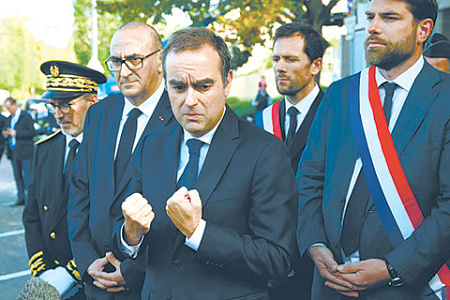
France’s freshly appointed government, led by Prime Minister Sébastien Lecornu, finds itself in immediate jeopardy following a no-confidence motion just hours after its formation. This stunning development underscores the deep political fragmentation gripping the nation, as the new cabinet struggles to secure parliamentary approval for the vital 2026 state budget. The inability of a deeply divided parliament to agree on this crucial financial blueprint threatens to plunge France into further economic uncertainty, with opposition parties showing no signs of compromise.
The political drama unfolded just a day before the new government’s inaugural meeting, scheduled for October 14th at the Élysée Palace under President Emmanuel Macron. This marks Lecornu’s second stint as Prime Minister within a week; he had resigned on October 6th, only to be re-appointed four days later, highlighting President Macron’s apparent difficulty in finding an alternative leader capable of navigating the complex political landscape.
The slightly reshuffled cabinet includes a mix of centrists, Macron-aligned conservatives, and figures from civil society. Notably, Jean-Pierre Farandou, former head of the state railway company SNCF, takes on the Labour Ministry. Monique Barbu, with an extensive background at the United Nations, assumes the Ministry of Ecological Transition. Catherine Vautrin moves from the Labour Ministry to Defence, with her portfolio including oversight of military aid to Ukraine – a critical role given ongoing geopolitical tensions. The continuity of Jean-Noël Barrot as Foreign Minister signals a steadfast, firm stance towards Moscow, indicating that a rapprochement with Russia is definitively not on the new government’s agenda.
The fundamental challenge facing Lecornu’s new administration mirrors that of its predecessor: it enjoys presidential backing but lacks a stable parliamentary majority. With President Macron’s allies in the National Assembly holding only a minority of seats, the parliamentary opposition wields significant leverage, fueling their stubborn refusal to compromise on key legislative issues. To successfully oust the government, however, the disparate right and left-wing factions would need to unite – a formidable task given their ideological differences.
The no-confidence motion was spearheaded by two prominent political forces. Mathilde Pano, leader of the far-left “La France Insoumise” (LFI) parliamentary group, declared that deputies from overseas territories, communists, environmentalists, and her entire party were seeking the Prime Minister’s dismissal. “The country cannot afford to waste time. Lecornu will fall, and Macron will follow,” she asserted on social media. The far-right “Rassemblement National” (RN), led by Jordan Bardella, is the other vocal proponent of the government’s removal. Bardella criticized the current administration as a “game of musical chairs that will fundamentally change nothing,” arguing that Macron’s government has had enough chances since 2017.
For LFI and RN to succeed in their bid to unseat the government, they would require the support of the Socialist Party. The Socialists, however, appear to be weighing their options, deliberating whether to align with the opposition or with Macron’s camp. Their support for the President and Prime Minister hinges on two key conditions: the repeal of the unpopular pension reform, which raised the retirement age from 62 to 64, and the introduction of a wealth tax.
The fate of Lecornu’s second government is expected to be decided this Thursday with the no-confidence vote. Concurrently, by October 14th-15th, the cabinet is mandated to present the 2026 budget draft, which is unlikely to satisfy a fragmented parliament. Significant contention surrounds proposed cuts to public spending, which France desperately needs given it has the largest budget deficit in the European Union. Failure to pass the budget this week would mean the country defaults to the previous year’s financial plan for 2026, exacerbating economic woes.
While LFI and RN blame Macron for the political deadlock, the President places responsibility squarely on their shoulders. He recalled the events of a month prior, when the previous Prime Minister, François Bayrou, was forced to resign after his proposals were rejected, deepening the governmental crisis. “The political forces that voted no-confidence in Bayrou and played a role in destabilizing Lecornu’s government bear full responsibility for this disorder. I ensure continuity, stability, and will continue to do so. Everyone must continue working in this direction,” the head of state declared. This firm stance indicates his clear refusal to voluntarily step down, a move not mandated by the French Constitution except in cases of incapacity or high treason.
Under these challenging circumstances, the options for France’s political future are constrained. A narrow path to government survival might open if the Socialists’ demands are met. However, the possibility of early parliamentary elections looms large – a scenario actively sought by both “La France Insoumise” and “Rassemblement National” as they intentionally obstruct government operations. Should snap elections occur, it is widely anticipated that these two parties would significantly increase their representation in the National Assembly, further intensifying the political fragmentation.
This escalating political turmoil in France not only exposes President Macron’s struggle to forge consensus but also points to a broader institutional crisis within the Fifth Republic. Established in 1958 with a constitution that significantly bolstered presidential powers, the current governmental structure appears increasingly ill-suited to effectively address the interests and demands of the French populace, putting its long-term stability into question.
